
Africa needs almost R5,5 trillion ($450bn) of investment in the energy sector to reduce power outages by half and achieve energy excess in urban areas, former acting Eskom CEO Zethembe Khosa told an energy conference in Cape Town on Tuesday.
“We are open for business because electricity will create freedom for our people,” Khosa told the African Utility Week.
“The International Energy Agency’s Africa Energy Outlook estimates that Africa needs an additional $450bn investment into the sector to reduce power outages by half and achieve universal electricity access in urban areas,” said Khosa, who returned to the Eskom board after a short stint as acting CEO after Tshediso Matona was suspended.
He was speaking on behalf of acting Eskom CEO Brian Molefe, who was briefing deputy president Cyril Ramaphosa on developments at the state utility. Molefe is expected to attend the rest of the week-long conference.
“We are open for business because we know that as we continue to electrify at the current rate, we are creating future markets for investors,” he said. “New markets, which bring new potential.”
“Our energy usage in sub-Saharan Africa has risen by an unprecedented 45% in the past 15 years,” he said, but added that 60% of the people of Africa do not have electricity.
“We are inviting investors who share our vision of a self-determined Africa,” he said. “Investors who are willing to work with us to unlock the potential of the African people.”
Africa needed a Franklin Roosevelt-inspired New Deal to electrify the continent to reduce inequality and end poverty, said Khosa, explaining that “75% of the poorest countries in the world are in Africa”.
“Poverty is the antithesis of freedom and equality,” he said. “It is the underlying strife of people. In South Africa, people are turning against each other in xenophobic attacks.
“We need to work together towards a New Deal where electricity plays a part to reduce inequality and lack of freedom,” he said.
Khosa said South Africa was developing one of the largest independent power producer programmes in the world.
“The programme contributed $150bn (R1,8 trillion) in foreign direct investment,” he said.
“This programme builds on South Africa’s attraction of independent power producers as far back as the 1970s and today 1 500MW of power are supplied by independent producers in South Africa.”
“The $450bn investment required is only 3% of the total global energy investment,” he said. “The New Deal on African energy must incorporate ways of further co-operation in the region in order to attract a larger percentage of the global energy investment and enable multiple countries to benefit from it.”
Khosa applauded the success of the Southern Africa Power Pool that celebrated its 20 year anniversary this year.
“Through this vehicle we have seen the facilitation of socio-economic co-operation and integration among 15 southern African states, and seen the benefits to approximately 260m Africans,” he said. — Fin24




